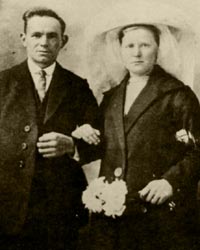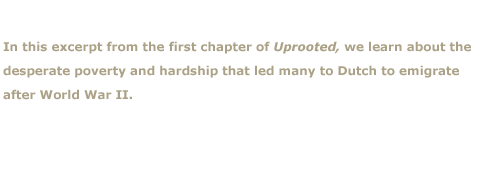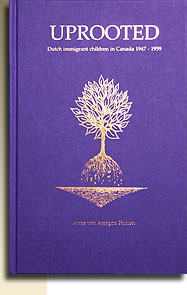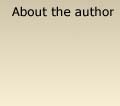


 |
|||
 |
|||
 |
 |
||
|---|---|---|---|
Hendrika began working full time on a farm that same year. The farmer was sick, as was one of two babies, which died while Hendrika worked there. She not only had to milk the cows by hand and take them to and from the field, but also had to do the housework. Moreover, she was in some danger from a hired hand who promised her a comb if she would go into the woods with him. Her parents, hearing of this, soon brought her home. A second job, where she did housework only, was better and she stayed until she was thirteen.
"Her third job was with Driek Van Rybroek, who also had three children," writes John in his family history, Hendrika and her children. "Mom had to work very hard here. She had to work in the fields like a man, from 5 a.m. until dark. Then she still had to do all the housework. The food was poor – she never got any sugar. Most of the meals consisted of dark bread with smoked bacon. Since Mom unfortunately could not eat the bacon, the hired hand ate it for her. Mom just ate the dry bread. Sometimes she could not walk from weakness. Mom worked here until she was sixteen.
"Tinus Adriaans was her next employer. He had seven children. Conditions were no better here. Mom had to break up piles of manure, do all the field work – haying and binding straw – until her fingers bled. In the mornings before the field work, she had to break the ice in the ditch to wash the diapers. Sometimes, when hanging the washing, her fingers would stick to the steel line from the cold. Mom never had a free moment here. Even in the evenings she was busy mending socks. She was allowed to go home on Sunday afternoons only after all the housework was done."
And so her story continues: Christmas Day when the farmer's children had so many sweets they threw them down; Hendrika hungry and alone in her room, wishing she could eat their leftovers off the floor. In the afternoon she went home to be fed by her mother, only to return to work the next morning. When she was finally allowed to come home at the age of nineteen, she was still hired out as a farm hand by the day.
"Mom recalls raking and spreading manure until her hands were so cramped that she could not straighten her fingers. On occasion the pain in her fingers was so unbearable that she could not help but weep. Only then was she allowed to rest."
Desperate as conditions were for Hendrika during her youth, she was far from being an exceptional case. My own mother-in-law, Annigje Ridderman Hutten, suffered sufficient hardship that many decades later she mostly refused to speak of that time. When she was twelve years old her father and little sister were swept away by the Spanish flu that devastated Europe after the first war. Her widowed mother was left with five children of whom the oldest, Freek, was fourteen.
Although the neighbours tried to help, Berendina relied on Freek to supply the family income. He drove a milk wagon, picking up milk from local farmers before heading across the German border to a milk factory. Moreover, of twelve-year-old twins, Annigje was chosen as the stronger one and sent away to work on a farm. Not only would she earn a little, it was one less mouth to feed.
In the early 1980's when I tried to pry some early history out of her, Mom would tell me only one anecdote. Being allowed home only one Sunday every two weeks, this twelve-year-old child would walk to the highest spot she could find on the farm. Here she was able to see the tip of the church tower in her home town.
That's all she ever told me, but it was enough. Even yet I find it difficult to think how this child, reeling from the loss of father and baby sister, was torn from her remaining family and sent to work like a man among strangers. Multiply her story by thousands, and you get some idea of who our parents and grandparents were. It was Mom's generation that pulled up roots after World War II in hope of finding a better land.
There was serious economic instability behind the poverty of our parents and grandparents. From the late 1800s on, Holland had seen massive loss of employment as its fuel peat supplies were depleted. Particularly in the northern provinces of Friesland and Drenthe this gave rise to massive poverty among the working class. As the country switched from peat to coal and oil, while agriculture simultaneously began to mechanize, severe employment problems arose. In fact, the first wave of Frisians had begun leaving for Winnipeg, Canada during the 1890s already.
Not only was their early life often hard, but our parents subsequently lived through the Great Depression. During this decade it's almost a wonder that young people met and married. Life consisted of work, with courtship often limited to Sunday afternoon or evening.
Given the extreme poverty of that time, it's not surprising that most young people handed over their wages, often paid annually, to their parents. The parents, in return, might provide basic necessities such as clothing and a bicycle for transportation. Food came with the job. Discretionary spending was unheard of. When it came time to marry – and sometimes it was necessary that the marriage take place quickly, after a lengthy courtship – there was little money to buy household furnishings.
The Depression was followed by the 1940 German invasion and occupation of Holland, a five-year span of increasing hardship and deprivation. Life continued with some semblance of normalcy. My parents produced five children during the war, a natural enough situation given the Reformed churches' absolute ban on birth control. Many families suffered far more disruption than we did; in some cases they were torn apart when the father or older siblings had to go into hiding. Hunger and starvation, a grave reality in urban Holland during the Hongerwinter of 1944 – 45, did not strike the rural population. However, scarcity was widespread and babies certainly were not well nourished.
Postwar Holland brought its own level of misery. After the jubilation of freedom regained, with the Canadian soldier liberators welcomed with open arms (literally; many girls later left as Dutch war brides to Canada, while thousands of other girls were left with fatherless babies), the population faced new realities. Not only was the economy in total shambles, but a new class of government bureaucrats appeared bent on making life miserable for the common man. During all these years, our parents had no choice but to keep their hands to the plow. They had no luxuries and few choices. (Incidentally, Hendrika married Frans van Bakel, and they eventually brought a dozen children to Canada in 1949.)